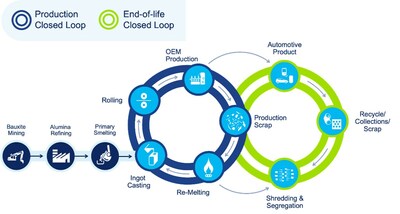Top 4 benefits of customized, closed-loop and end-of-life recycling programs for automakers
By Jamie Zinser, Vice President, Global Automotive, Novelis Inc.
ATLANTA, June 6, 2023 /PRNewswire/ -- As the global automotive industry strives to reach ambitious sustainability targets, most notably regarding carbon emissions, it continues to gravitate toward the world's infinitely recyclable material—aluminum. In fact, aluminum can be recycled and reused endlessly without losing its material properties. This phenomenon is the foundation of a circular economy for the automotive industry fueled by closed-loop and end-of-life recycling.
To help the automotive industry reduce carbon emissions and ultimately achieve carbon neutrality, as well as reduce waste and preserve natural resources, Novelis, the largest recycler of aluminum in the world, works in partnership with automakers to create and implement customized circular economy programs. These programs include closed-loop recycling solutions that address the unique infrastructure and business dynamics of each automaker. Novelis is dedicated to shaping the automotive circular economy of the future and understands that truly collaborative and transparent partnerships with automakers are the key to realizing this goal.
Jamie Zinser, Vice President, Global Automotive at Novelis, outlines the top 4 benefits of customized closed-loop recycling programs for automakers.
1. Preserving the value of aluminum alloys: Recycled aluminum is essential for the future of sustainable mobility. A customized, closed-loop and end-of-life recycling program is key to keep like alloys separated, which is critical to maintaining the performance specifications of automotive alloys.
To enable this, aluminum scrap segregation and sorting technologies are critical to any successful recycling program as scrap aluminum can be collected and transformed into new vehicle parts. These processes separate different alloys by refined alloy families. Keeping these alloys separate ensures the same alloy can go back into its original application, which preserves its value, and requires less primary metal input, enabling the conversion of high-quality scrap material into new coils. While aluminum scrap separation is a complex process, Novelis continues to invest in sorting and segregation technologies to streamline the process for automakers. The use of recycled aluminum reduces the demand for raw materials.
2. Reducing CO2 emissions: Recycled aluminum uses approximately 95% less energy than primary aluminum production, resulting in 95% less carbon emissions. Increasing the use of recycled aluminum improves energy efficiency and promotes a true circular economy. Closed-loop agreements with customers allow Novelis to recycle production scrap into new automotive sheet and its customers to enhance the sustainability profile of their vehicles.
3. Establishing a secure supply chain: Using recycled materials in a circular economy system strengthens the automaker's supply chain and makes its production schedule less vulnerable to disruptions caused by external factors. The average stamping process turns 30%-40% of an aluminum coil into scrap that can be recycled back into the same product, leveraging aluminum's unique benefit of being infinitely recyclable without losing its material properties.
4. Enhancing economic benefits: Because aluminum is infinitely recyclable, automakers can leverage closed-loop recycling programs to reuse aluminum again and again without impacting its properties. This reduces total vehicle costs and helps maximize the sustainability benefits of aluminum, including its extensive lightweight properties that can enable EV efficiency and allow for traveling longer distances on a single battery charge.
As the leader in automotive closed-loop recycling, Novelis is working extensively with OEMs around the world. In North America, we worked with our customer to develop the largest closed-loop system in the automotive industry. Through this partnership, we recycle enough aluminum scrap generated from the automotive stamping process to produce 37,000 new vehicle bodies each month. In addition, Novelis worked with partners in Europe to establish the first regional closed-loop recycling system, which is a dedicated round-trip railway service that delivers materials across Europe.
With a common goal of a more sustainable future, the automotive and aluminum recycling industries can work together to develop solutions to make the circular economy a reality today.
About the author:
Jamie Zinser is Vice President of Global Automotive at Novelis, where she is responsible for global automotive commercial strategy.
Jamie has nearly 30 years of experience in the automotive industry. Prior to joining Novelis, Jamie was Chief Technology Officer at Global Automotive Systems, where she was responsible for new business development strategy, product and process engineering, and program management. Jamie also worked at DURA Automotive Systems for two decades in engineering and leadership roles.
Jamie is a sought-after speaker for industry events and was recognized as one of the Top 100 Leading Women in the North American Automotive Industry and as a Rising Star by Crain's Automotive News. She is a mentor to the Women of Tomorrow (WOT) Mentor and Scholarship Program for at-risk young women.
Jamie is also Vice President of Alumobility and a member of its Board of Directors, where she lends her expertise in automotive and aluminum technology development, OEM-supplier collaboration, and global manufacturing to the organization's mission.
Jamie earned her Bachelor of Science in Mechanical Engineering degree from GMI Engineering and Management Institute in Flint, Michigan (now Kettering University).
![]() View original content to download multimedia:https://www.prnewswire.com/news-releases/top-4-benefits-of-customized-closed-loop-and-end-of-life-recycling-programs-for-automakers-301843874.html
View original content to download multimedia:https://www.prnewswire.com/news-releases/top-4-benefits-of-customized-closed-loop-and-end-of-life-recycling-programs-for-automakers-301843874.html
SOURCE Novelis Inc.
Released June 6, 2023

